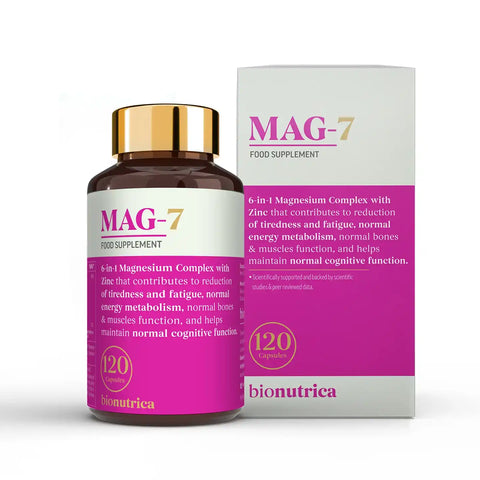For many people in the UK, getting a good night's sleep can seem like an impossible task. Between hectic work schedules, stress, and endless screen time, falling asleep and staying asleep is becoming increasingly difficult. While lifestyle changes, like reducing caffeine intake and establishing a consistent bedtime routine, can help, sometimes your body just needs a little extra support.
Magnesium, an essential mineral, plays a key role in calming the nervous system, relaxing muscles, and regulating sleep hormones like melatonin. Many people are turning to magnesium supplements as a natural way to improve sleep quality without relying on prescription medication.
In this 2025 guide, we'll find Best Magnesium For Sleep in the UK, including capsules, powders, and other skincare options. You'll learn which forms are most effective, how to choose the right product, and practical tips for incorporating magnesium into your routine so you can finally enjoy restful and energizing sleep.
What Does Magnesium Do for Sleep?
Magnesium is one of the body’s most vital minerals, essential for muscle relaxation, nerve balance, and energy production. Research published in journals such as Sleep Foundation and PubMed Central highlights that magnesium plays a central role in improving sleep quality by regulating neurotransmitters and hormones associated with rest.
It supports the calming neurotransmitter GABA, which quietens the nervous system, reduces stress responses, and makes it easier to drift into sleep. Magnesium also aids melatonin production, the hormone that governs the body’s circadian rhythm, helping signal when it’s time to rest.
Additionally, studies show that balanced magnesium levels can reduce cortisol, the primary stress hormone, promoting a relaxed mind before bedtime. People who have difficulty sleeping due to anxiety, muscle tension, or restless legs syndrome often find relief through magnesium supplementation, especially in well-absorbed forms like citrate or glycinate. Clinical findings reveal that adequate magnesium intake not only helps people fall asleep faster but also enhances deep, restorative sleep, critical for body repair and mental clarity.
Best Forms of Magnesium for Sleep
1. Magnesium Glycinate
This is widely regarded as the best magnesium for sleep in the UK. Glycinate is bound to the amino acid glycine, which has calming properties that help with insomnia and anxiety.
2. Magnesium Citrate
A popular option that also supports digestion. While not as calming as glycinate, it’s still effective for sleep and more affordable.
3. Magnesium Threonate
Designed to cross the blood-brain barrier, this form may help with mental clarity and sleep, although it’s more expensive and not widely available in UK shops.
4. Magnesium Malate
Often recommended for people with chronic fatigue and muscle pain, this form supports energy during the day and may help with sleep quality when combined with other types.
Top Magnesium Supplements for Better Sleep in the UK
Here are some UK-available magnesium supplements highly rated by users and experts alike:
1. Heights Magnesium+
- Type: Magnesium Glycinate
- Pros: Highly absorbable, gentle on the stomach
- Available at: heights.com
2. Wild Nutrition Food-Grown Magnesium
- Type: Naturally sourced magnesium
- Pros: Whole-food form, great for sensitive stomachs
- Available at: wildnutrition.com
3. BetterYou Magnesium Sleep Spray
- Type: Topical magnesium chloride
- Pros: Easy application, ideal for those who dislike pills
- Available at: Boots, Holland & Barrett
4. Inessa Magnesium
- Type: Glycinate, Citrate, and Threonate blend
- Pros: Comprehensive formula for multiple needs
- Available at: inessawellness.com
5. Vitabiotics Ultra Magnesium
- Type: Magnesium Oxide and Citrate
- Pros: Affordable, UK brand, widely available
- Available at: vitabiotics.com
How to Choose the Best Magnesium for Your Needs
- Consider absorption: Glycinate is the most bioavailable.
- Check for fillers: Avoid artificial additives.
- Dosage: Most adults need between 300–400 mg daily. Start with a lower dose and work up.
- Read reviews: UK-based reviews often mention real-life results specific to British users.
- Speak to your GP: Especially if you’re taking other medications or have underlying health conditions.
How to Incorporate Magnesium into Your Routine
Incorporating magnesium into your routine is simple and highly beneficial for sleep, energy, and overall well-being. The recommended daily intake for adults is 400-420 mg for men and 310-320 mg for women, rising slightly during pregnancy and breastfeeding. Start with magnesium-rich foods such as leafy greens, legumes, nuts, seeds, whole grains, dark chocolate, and fortified cereals.
To enhance absorption, pair magnesium-rich foods with vitamin D and avoid excessive caffeine or alcohol. Supplements like magnesium glycinate, citrate, or lactate are better absorbed and gentler on digestion than oxide. Taking magnesium in the evening may boost relaxation and support better sleep quality, especially for stress or insomnia.
Common Mistakes to Avoid While Taking Magnesium
Many people take magnesium for relaxation, sleep, or muscle recovery, but they make a number of mistakes that reduce its effectiveness or cause side effects.
- One common error is choosing the wrong type of magnesium. Forms like oxide and sulfate have poor absorption and often cause digestive discomfort, while glycinate or citrate are gentler and more bioavailable.
- Another frequent mistake is taking magnesium alongside competing nutrients. Minerals such as calcium, zinc, and iron share absorption pathways, which can limit magnesium uptake if consumed simultaneously. Experts recommend spacing these supplements by at least two hours.
- Typically, exceeding doses of more than 350 mg of supplemental magnesium daily can trigger diarrhea, nausea, or mineral imbalances, especially in those with kidney problems.
- Ignoring cofactors like vitamin D or potassium is another pitfall, since these nutrients aid magnesium absorption and utilization. Similarly, excessive caffeine, alcohol, or stress can drain magnesium levels, diminishing results.
-
Solely relying on supplements while neglecting magnesium-rich foods such as leafy greens, nuts, and legumes undermines long-term balance. By choosing the right form, maintaining moderation, and combining it with healthy lifestyle habits, magnesium can deliver its full benefits safely and effectively.
Conclusion
Quality sleep is essential for health, yet many in the UK struggle to get enough rest. Magnesium supports better sleep by calming the nervous system, relaxing muscles, and regulating melatonin. Supplements, especially magnesium glycinate, offer an effective solution.
When choosing a product, consider form, dosage, and personal needs, whether capsules, powders, or topical options. Incorporating magnesium into a consistent bedtime routine enhances its effects, helping you fall asleep faster and wake up refreshed.
Always consult a healthcare professional before starting supplements. With the right magnesium and routine, better sleep and improved well-being are within reach.





